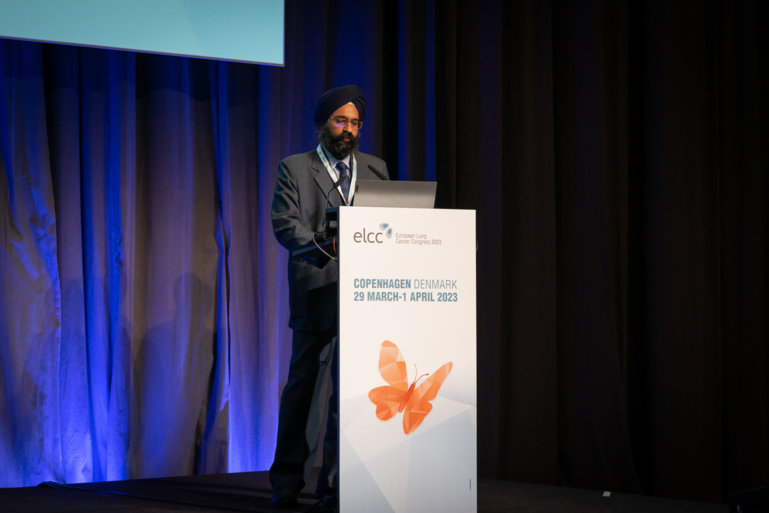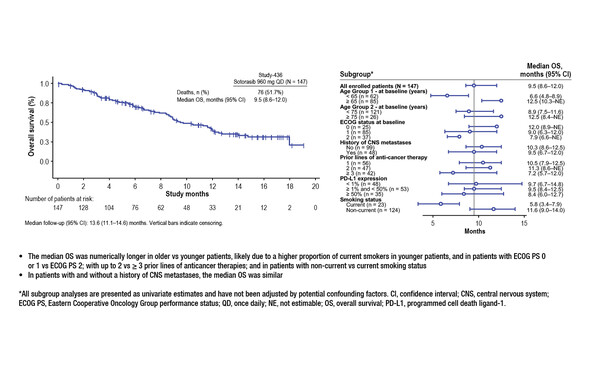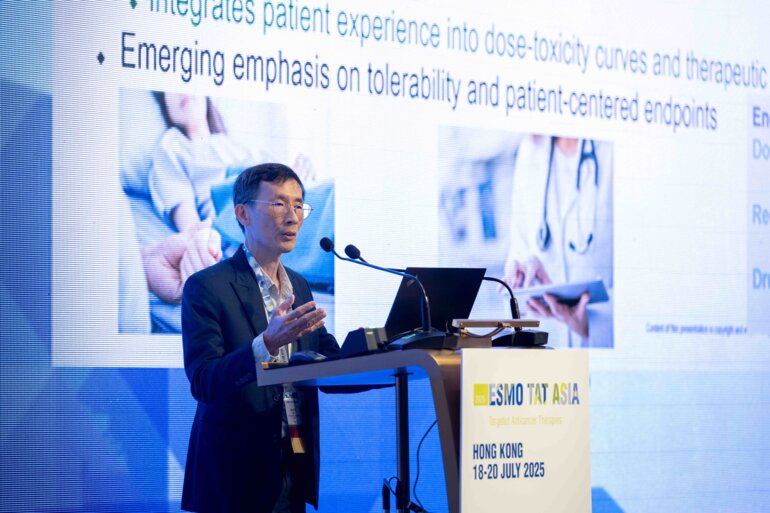Data from two studies improve knowledge of how to treat patients with a disease harbouring this molecular alteration and how to monitor response to treatment
Presentations at the European Lung Cancer Congress (ELCC) 2023 (Copenhagen, 29 March–1 April) provide real-world information on survival data with sotorasib and suggest mutation allele frequency clearance as a sensitive marker for response to adagrasib.
In a first study, data from a global expanded access programme for sotorasib across six countries (EAP Study-436) reported a median overall survival (OS) of 9.5 months (95% confidence interval 8.6–12.0) at a median follow-up of 13.6 months in 147 patients with KRAS G12C-mutated advanced non-small cell lung cancer (NSCLC) (Abstract 7MO). All patients had exhausted other standard-of-care treatments. Median OS was numerically longer in patients with an ECOG performance score of 0 (12.0 months) or 1 (9.0 months) versus 2 (7.9 months), those who had received one (10.5 months) or two (11.3 months) lines of therapy versus more than two (7.2 months) and patients who were non-current versus current smokers (11.6 months versus 5.8 months). One-third of patients (n=48) had a history of central nervous system (CNS) metastases: the median OS among these patients was similar to that in patients without a history of CNS metastases (9.5 months versus 10.3 months). Progression-free survival (PFS) data had been reported previously at the ESMO Congress 2022 (Ann Oncol. 2022;33(Suppl 7):S448–S554) and were similar to that reported in the CodeBreaK 200 trial of sotorasib versus docetaxel (Lancet. 2023;401:733–746).
Grade ≥3 treatment-related adverse events (TRAEs) were reported in 21.1% of patients. Among TRAEs, 21.1% led to dose interruptions/reductions, 5.4% led to sotorasib discontinuation and there was one fatal TRAE (pneumonitis).
“Over the past few years, we have seen how agents targeting KRAS G12C mutations are revolutionising the way we treat patients with NSCLC harbouring this molecular alteration,” says Prof. Alessandra Curioni-Fontecedro from HFR Fribourg – Kantonsspital, Switzerland. “The OS findings from this extended access programme are very informative, even though they are not collected in a clinical trial, and confirm that sotorasib works and can improve patient outcomes. The median OS is impressive in what is a very heavily pre-treated population of patients, who had received up to eight lines of therapy. In addition, it is reassuring that the presence of brain metastases did not limit the effects of sotorasib, with similar survival being observed in patients with and without CNS metastases.”
Also presented at ELCC 2023, an exploratory analysis of the phase II KRYSTAL-1 study of adagrasib for advanced/metastatic KRAS G12C-mutated NSCLC (N Engl J Med. 2022;387:120–131) suggests a potential association between mutation allele frequency clearance (MAFC) and response (Abstract 8MO). Results revealed that 31 of 35 patients (89%) eligible for circulating tumour DNA (ctDNA) analysis had an MAFC ≥90% by cycle 4 day 1 (C4D1) and that 68% of these had an objective response. By contrast, none of the four patients with MAFC <90% by C4D1 had an objective response. In addition, MAFC ≥90% at C4D1 was associated with longer PFS than MAFC <90% at C4D1. Baseline mutation allele frequency did not appear to correlate with response.
“These exploratory data are very important in increasing knowledge about the types of ctDNA elements that might help clinicians monitor patient response to treatment,” observes Curioni-Fontecedro. “What is more, the results suggest that because MAFC is a very sensitive measure – with results being seen as early as C4D1 – it may provide a way to avoid or tailor radiological imaging for restaging of patients’ disease. Many clinical trials involve imaging every 6 weeks, which places a considerable burden not only on healthcare resources but also on patients, who can find repeated imaging very stressful. Measurement of MAFC in blood samples at intervening periods may mean that the requirement for imaging could be limited to just baseline and the 3-month endpoint,” she says.
With many more KRAS inhibitors targeting not just G12C but also other molecular alterations being investigated, Curioni-Fontecedro believes that further advances in the field will come from combination therapy in the future. “We know that co-alterations are common in tumours harbouring KRAS mutations and so it is likely that combination therapy will be key to improving response,” she concludes. “For example, the combination of adagrasib and the EGFR inhibitor cetuximab has shown efficacy in heavily pre-treated patients with metastatic colorectal cancer (N Engl J Med. 2023;388:44–54) and ideally we would like to see in the near future, successful combination approaches being investigated in lung cancer.”
Abstracts presented:
Maimon N, et al. Sotorasib in KRAS G12C-mutated advanced non-small cell lung cancer (aNSCLC): overall survival (OS) data from the global expanded access program (EAP study-436). European Lung Cancer Congress 2023, Abstract 7MO
Mini Oral 1, 30.03.2023, h. 17:00 – 17:50, Auditorium 4
Jänne PA, et al. Adagrasib (MRTX849) in patients with advanced/metastatic KRASG12C-mutated non-small cell lung cancer (NSCLC): Preliminary analysis of mutation allele frequency. European Lung Cancer Congress 2023, Abstract 8MO
Mini Oral 1, 30.03.2023, h. 17:00 – 17:50, Auditorium 4







